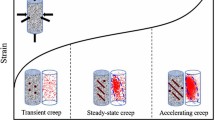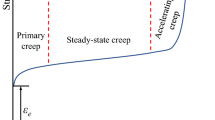Abstract
Concrete is a material that is an intermediate between an ideal solid and an ideal fluid. The creep of concrete is related not only to the loading age and duration, but also to its temperature and temperature history. Fractional order calculus is a powerful tool for solving physical mechanics modeling problems. Using a software element based on the generalized Kelvin model, a fractional order creep model of concrete considering the loading age and duration is established. Then, the hydration rate of cement is considered in terms of the degree of hydration, and the fractional order creep model of concrete considering the degree of hydration is established. Moreover, uniaxial tensile creep tests of dam concrete under different curing temperatures were conducted, and the results were combined with the creep test data and complex optimization method to optimize the parameters of a new creep model. The results show that the fractional tensile creep model based on hydration degree can better describe the tensile creep properties of concrete, and this model involves fewer parameters than the 8-parameter model.




Similar content being viewed by others
References
Barpi, F., Valente, S.: A fractional order rate approach for modeling concrete structures subjected to creep and fracture. Int. J. Solids Struct. 41, 2607–2621 (2004)
Bazant, Z.P., Kaplan, M.F.: Concrete at High Temperatures: Material Properties and Mathematical Models. Longman, Harlow (1996)
Celauro, C., Fecarotti, C., Pirrotta, A., Collop, A.C.: Experimental validation of a fractional model for creep/ recovery testing of asphalt mixtures. Constr. Build. Mater. 36, 458–466 (2012)
Chen, W., Sun, H.G., Li, X.C.: Fractional Derivative Modeling of Mechanics and Engineering Problems. Science Press, Beijing (2010)
De Schutter, G.: Applicability of degree of hydration concept and maturity method for thermo-visco-elastic behaviour of early age concrete. Cem. Concr. Compos. 26(5), 437–443 (2004)
Freisleben, H.P., Pedersen, E.J.: Maturity computer for controlled curing and hardening of concrete. Nord. Betong 1, 19–34 (1977)
Gong, C., Wang, Z.L.: Features of MATLAB Optimization. Publishing House of Electronics Industry, Beijing (2012)
Huang, Y.Y., Zheng, H.: Application of fractional order calculus rheological model in destruction analysis of rock structure accelerated rheological process. Comput.-Aided Eng. 19(4), 20–24 (2010)
Huang, G.X., Hui, R.Y., Wang, X.J.: Creep and Shrinkage of Concrete. China Electric Power Press, Beijing (2012a)
Huang, Y.Y., Zheng, H., Zhou, Y.H.: Inversion of actual creep degree of dam concrete based on the measured strain. Hydro-Sci. Eng. 6, 44–50 (2012b)
Neville, A.M., Dilger, W.H., Brooks, J.J.: Creep of Plain and Structural Concrete. Construction Press, London/New York (1983)
Oeser, M., Pellinen, T., Scarpas, T., Kasbergen, C.: Studies on creep and recovery of rheological bodies based upon conventional and fractional formulations and their application on asphalt mixture. Int. J. Pavement Eng. 9(5), 373–386 (2008)
Test code for hydraulic concrete (SL352-2006). China Water & Power Press, Beijing (2006)
Wang, P.M., Feng, S.X., Liu, X.P.: Research approaches of cement hydration degree and their development. J. Build. Mater. 8(6), 646–652 (2005)
Wei, Y., Liang, S.M., Guo, W.Q.: Stress prediction of early age concrete incorporating hydration degree-based tensile creep under restrained conditions. J. Build. Struct. 37(10), 162–168 (2016)
Zhang, Z.M., Zhou, H.J., Yin, B.: Equivalent time-based concrete creep. J. Hohai Univ. 33(2), 173–176 (2005)
Zhu, B.F.: Several issues on concrete creep theory. J. Hydraul. Eng. 29(3), 35–40 (1982)
Zhu, B.F.: Constrained extreme value method for parameter fitting of concrete creep equation. J. Hydraul. Eng. 7, 75–76 (1992)
Zhu, B.F.: Relation between extensibility, age, tensile and compressive strength of concrete. China Civ. Eng. J. 5, 72–76 (1996)
Zhu, B.F.: Temperature Stress and Temperature Control of Mass Concrete. China Electric Power Press, Beijing (1999)
Acknowledgements
This study was supported by the National Natural Science Foundation of China under Grant No. 51779130. The authors declare that there is no conflict of interests regarding the publication of this paper.
Author information
Authors and Affiliations
Corresponding author
Rights and permissions
About this article
Cite this article
Huang, Y., Xiao, L., Bao, T. et al. Fractional order creep model for dam concrete considering degree of hydration. Mech Time-Depend Mater 23, 361–372 (2019). https://doi.org/10.1007/s11043-018-9389-9
Received:
Accepted:
Published:
Issue Date:
DOI: https://doi.org/10.1007/s11043-018-9389-9




